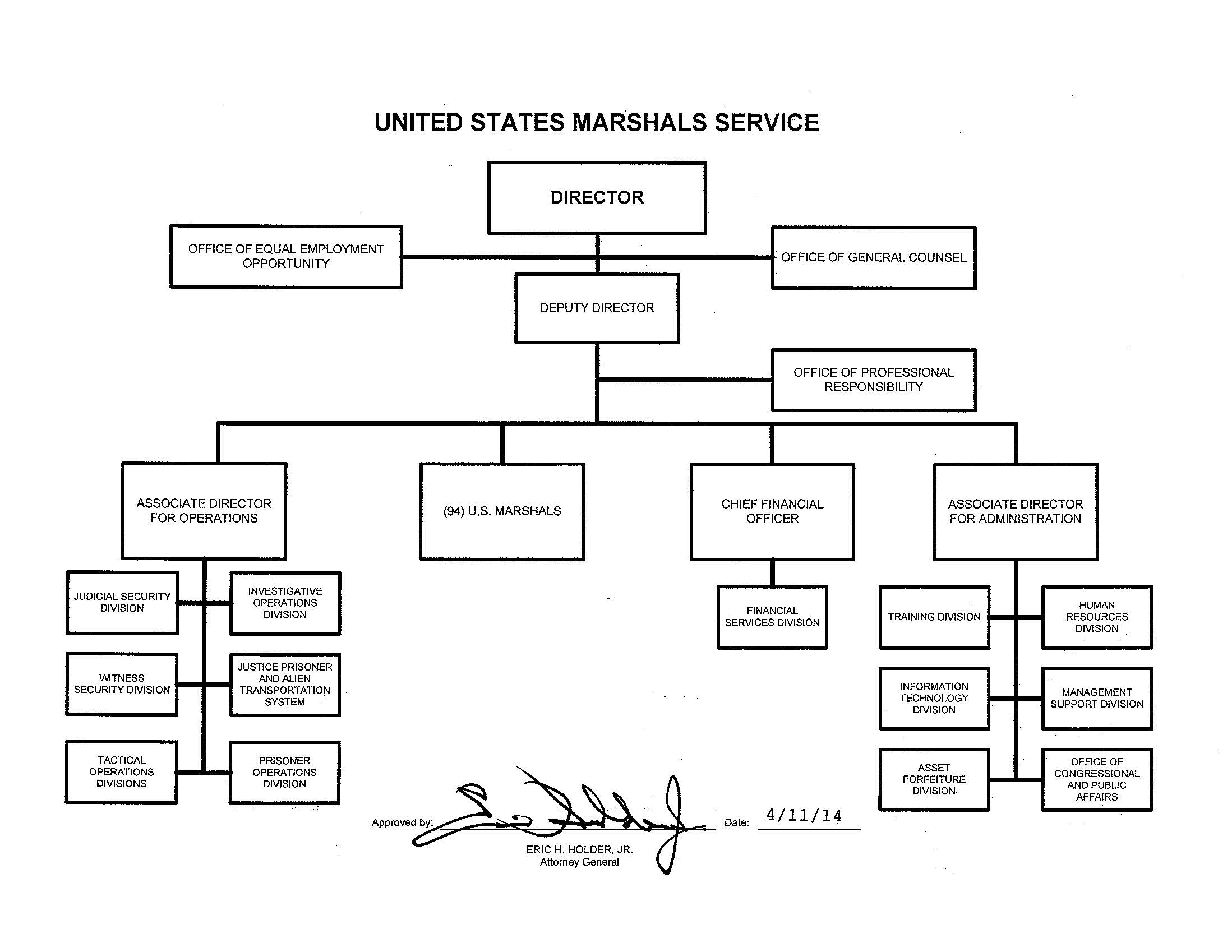United States Marshals Service

The Judiciary Act of 1789 established the Office of the United States Marshal and the original 13 Federal judicial districts and called for appointment of a Marshal for each district. The Senate confirmed President Washington’s nomination of the first Marshals on September 26, 1789.
The Attorney General began supervising the Marshals in 1861. The Department of Justice was created in 1870 and the Marshals have been under its purview since that time. On May 12, 1969, DOJ Order 415-69 established the United States Marshals Service (USMS), with its Director appointed by the Attorney General. On November 18, 1988, the USMS was permanently established as a bureau within the Department under the authority and direction of the Attorney General with its Director appointed by the President.
The USMS is the nation’s first and most versatile Federal law enforcement agency. Ninety-four U.S. Marshals, appointed by the President or the Attorney General, direct the activities of 94 district offices and personnel stationed at more than 400 locations throughout the 50 states, Guam, Northern Mariana Islands, Puerto Rico, the Virgin Islands, Mexico, Jamaica, the Dominican Republic, and Colombia, with headquarters located in the Washington, D.C. area.
The USMS occupies a uniquely central position in the federal justice system by being involved in virtually every federal law enforcement initiative. Approximately 6,100 Deputy Marshals and career employees perform the following nationwide, day-to-day missions.
The role of the Marshals has had a profound impact on the history of this country since the time when America was expanding across the continent into the western territories. With changes in prosecutorial emphasis over time, the mission of the USMS has evolved as well. In more recent history, law enforcement emphasis has shifted with changing social mandates. With more resources dedicated to apprehending and prosecuting suspected terrorists, the USMS constantly assesses and responds to the increasing demands for high-level security required for many violent criminal and terrorist-related court proceedings.
Mission
The mission of the U.S. Marshals Service is to enforce federal laws and provide support to virtually all elements of federal justice system through multiple disciplines.
Major Functions
The major functions of USMS are to:
- Ensure the functioning of the federal judicial process by:
- Protecting members of the judicial family (judges, attorneys, witnesses, and jurors);
- Providing physical security in courthouses;
- Safeguarding endangered government witnesses and their families;
- Transporting and producing prisoners for court proceedings;
- Executing court orders and arrest warrants;
- Apprehending fugitives and recovering missing children; and
- Seizing assets gained by illegal means and providing for the custody, management, and disposal of forfeited assets.
- Judicial and Courthouse Security – ensure a safe and secure environment for all participants in federal judicial proceedings. This mission is accomplished by anticipating and deterring threats to the judiciary, deploying protective measures, and implementing the necessary security measures for all federal court facilities.
- Fugitive Apprehension – enhance the safety and security of our Nation’s communities by conducting complex criminal investigations to locate and apprehend federal fugitives, egregious state or local fugitives, and non-compliant sex offenders. This is accomplished by fostering cooperative working relationships with federal, state, local, and foreign law enforcement agencies; developing and leveraging national expertise in sophisticated technical operations; conducting psychological assessments of sex offenders; locating and recovering Critically Missing Children and collecting, analyzing, sharing criminal intelligence, and the management and disposal of all DOJ’s seized and forfeited assets.
- Prisoner Security and Transportation – ensure the custody of all federal prisoners is safe and humane from the time of arrest until the prisoner is acquitted, arrives at a designated Federal Bureau of Prisons facility to serve a sentence, or is otherwise ordered released from U.S. Marshals’ custody. This includes providing housing, medical care, and transportation throughout the U.S. and its territories; producing prisoners for all court-ordered appearances; and protecting their civil rights through the judicial process.
- Protection of Witnesses – provide for the security, health, and safety of government witnesses and their dependents whose lives are in danger as a result of their testimony against drug traffickers, terrorists, organized crime members, and other major criminals.
- Tactical Operations – ensure that the USMS is able to respond immediately to any situation involving high-risk/sensitive law enforcement activities, national emergencies, civil disorders, or natural disasters. A key component of this response is the USMS Special Operations Group (SOG). SOG utilizes its enhanced tactical capabilities to support USMS operations around the world in furtherance of the rule of law. The USMS also maintains other capabilities to manage crises including explosive detection canines; operating a 24-hour Emergency Operations Center; and ensuring that Incident Management Teams and Mobile Command Centers are always available.
- The Administrative Office of the United States Courts (AOUSC) that provides funding for administering the Judicial Facility Security Program;
- The Asset Forfeiture Fund that provides funding for managing and disposing of seized and forfeited assets;
- The Department’s Fees and Expenses of Witnesses appropriation that provides funding for securing and relocating protected witnesses; and
- The Organized Crime Drug Enforcement Task Force (OCDETF) that provides funding for apprehending major drug case fugitives.


